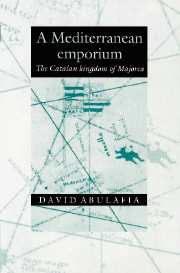Book contents
- Frontmatter
- Contents
- Preface
- Note on nomenclature
- List of the kings of Majorca, 1229–1343
- Note on the coinage of the kingdom of Majorca
- Map 1 The kingdom of Majorca
- Map 2 The western Mediterranean
- PART I UNITY AND DIVERSITY
- 1 The Balearic setting
- 2 The kingdom and its historians
- 3 The constitutional problem
- 4 One kingdom, three religions: the Muslims
- 5 One kingdom, three religions: the Jews
- PART II THE CROSSROADS OF THE MEDITERRANEAN
- Conclusion
- Appendices
- Bibliography
- Index
2 - The kingdom and its historians
Published online by Cambridge University Press: 05 October 2010
- Frontmatter
- Contents
- Preface
- Note on nomenclature
- List of the kings of Majorca, 1229–1343
- Note on the coinage of the kingdom of Majorca
- Map 1 The kingdom of Majorca
- Map 2 The western Mediterranean
- PART I UNITY AND DIVERSITY
- 1 The Balearic setting
- 2 The kingdom and its historians
- 3 The constitutional problem
- 4 One kingdom, three religions: the Muslims
- 5 One kingdom, three religions: the Jews
- PART II THE CROSSROADS OF THE MEDITERRANEAN
- Conclusion
- Appendices
- Bibliography
- Index
Summary
There are reasons why the Catalan kingdom of Majorca has received less attention than other Spanish kingdoms: the brief existence of a Majorcan dynasty, before its reincorporation into the Crown of Aragon in 1343; its limited territorial extent; the emphasis in Spanish historiography on Castile, are all factors that have diverted attention away from a kingdom that sat astride some of the key trade routes of the late medieval Mediterranean, that had a significant role in the dramatic events of the War of the Sicilian Vespers, and that poses important questions about the nature of royal autonomy in late medieval Europe. Above all, the fact that its territories are now divided between France and Spain has resulted in a general failure to look at the mainland territories of Roussillon, Cerdagne and Montpellier together with the Balearics. The sheer diversity of its archives, now spread between Paris, Perpignan, Montpellier and Palma, has combined with a natural reluctance among historians trained in the history of their nation and its regions to speak in one breath about what are now the French Pyrenees and the Balearic Autonomous Region. Even with the resurgence of Catalan national consciousness, there has been a tendency to articulate research around the regions established by the democratic government of modern Spain, with the result that the wider setting of the Balearics (and even on occasion the question of their links to their Catalonian motherland) has taken second place to their internal history.
- Type
- Chapter
- Information
- A Mediterranean EmporiumThe Catalan Kingdom of Majorca, pp. 20 - 33Publisher: Cambridge University PressPrint publication year: 1994



